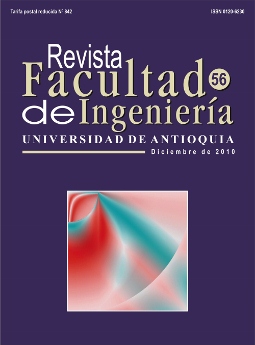Multiple interacting bad data errors identification in state estimation using combinatorial optimization algorithms
DOI:
https://doi.org/10.17533/udea.redin.14666Keywords:
leverage points, observability, combinatorial optimization algorithms, electrical power system, state estimationAbstract
In this paper the state estimation problem including hard detection errors are solved using combinatorial optimization algorithms. A novel procedure that combines the classic estate estimation methodology with leverage points theory which are used like sensibility factors and the observability theory are used to penalize the infeasibility in the objective function. The resultant model is solved using several optimization techniques like Tabu Search, Simulated Annealing, Particle Swarm, and the modified genetic algorithm of Chu-Beasley. In order to prove the proposed methodology the 57 nodes IEEE test system is used. The results obtained presents excellent quality.
Downloads
References
F. C. Schweppe, J. Wildes. “Power System Static State Estimation: Parts I, II and III”. IEEE Trans. Power Syst. Vol. 89. 1970. pp 120-135. DOI: https://doi.org/10.1109/TPAS.1970.292678
A. Monticelli. “Electric Power System State Estimation”. Proceedings of the IEEE. Vol. 88. 2000. pp 262-282. DOI: https://doi.org/10.1109/5.824004
E. Asada, R. Romero, A. García. “Identifying multiple interacting bad data in power system state estimation”. Power Engineering Society General Meeting. Vol. 1. 2005. pp. 571-577.
J. Grainger, W. Stevenson. Análisis de Sistemas de Potencia. Ed. Mc Graw Hill. 1998. pp. 603-647.
A. Monticelli, F. F. Wu, M. Yen. “Multiple bad data identification for state estimation by combinatorial optimization”. IEEE Trans. Power Delivery. Vol. 1. 1986. pp. 361-369. DOI: https://doi.org/10.1109/TPWRD.1986.4308016
A. Monticelli, F. F. Wu. “Network observability: Theory”. IEEE Trans. Power Appatatus and Systems. Vol. 104. 1985. pp. 1042-1048. DOI: https://doi.org/10.1109/TPAS.1985.323454
M. Celik, A. Abur. “A robust state estimator using transformations”. IEEE Trans. on Power Systems. Vol. 7. 1992. pp. 106-113. DOI: https://doi.org/10.1109/59.141693
M. Celik, E. Liu. “An incremental measurement placement algorithm for state estimation”. IEEE Trans. on Power Systems. Vol. 10. 1995. pp 1001-1009. DOI: https://doi.org/10.1109/59.466471
R. Gallego, A. Escobar, R. Romero. Programación Lineal Entera. Taller de publicaciones Universidad Tecnológica de Pereira. Pereira. 2008. pp. 1-250.
R. Gallego, A. Escobar, E. Toro. Técnicas Metaheurísticas de Optimización. Taller de publicaciones Universidad Tecnológica de Pereira. Pereira. 2008. pp. 1- 320.
J. Kennedy, R. “Eberhart. Particle Swarm Optimization”. Proceedings of IEEE International Conference on Neural Networks. Vol. 4. 1995. pp. 1942-1948.
Downloads
Published
How to Cite
Issue
Section
License
Copyright (c) 2018 Revista Facultad de Ingeniería

This work is licensed under a Creative Commons Attribution-NonCommercial-ShareAlike 4.0 International License.
Revista Facultad de Ingeniería, Universidad de Antioquia is licensed under the Creative Commons Attribution BY-NC-SA 4.0 license. https://creativecommons.org/licenses/by-nc-sa/4.0/deed.en
You are free to:
Share — copy and redistribute the material in any medium or format
Adapt — remix, transform, and build upon the material
Under the following terms:
Attribution — You must give appropriate credit, provide a link to the license, and indicate if changes were made. You may do so in any reasonable manner, but not in any way that suggests the licensor endorses you or your use.
NonCommercial — You may not use the material for commercial purposes.
ShareAlike — If you remix, transform, or build upon the material, you must distribute your contributions under the same license as the original.
The material published in the journal can be distributed, copied and exhibited by third parties if the respective credits are given to the journal. No commercial benefit can be obtained and derivative works must be under the same license terms as the original work.










 Twitter
Twitter